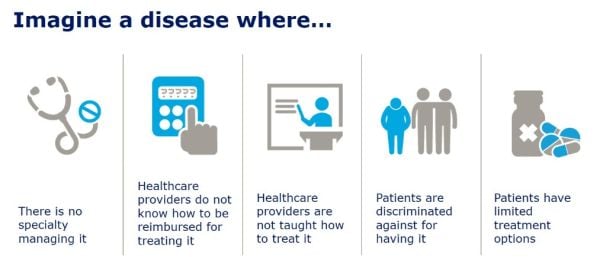“Energy cannot be created or destroyed; it can only be changed from one form to another,” said Albert Einstein, one of the greatest minds of our time. His words have taken on profound meaning as I search for solutions to address one of today’s most pressing global health, human, and economic issues: obesity. How can we connect the dots across sectors to combat bias, elevate public health education, empower patients and health-care providers alike, and improve access to affordable and quality health care?
A Perfect Storm
More than 100 million people live with obesity in the US today. That means many of us know or love someone who struggles with their weight. So, what brought us here? A perfect storm of biology, genetics, and the environment we live in. Obesity is linked to over 50 discrete disorders and an increased risk of developing many weight-related health conditions, including type 2 diabetes, cardiovascular disease, and some cancers.

It also comes with a price tag of $1.72 trillion in the US alone. The latest research from the Milken Institute suggests that chronic diseases driven by the risk factor of obesity and excess weight accounted for $480.7 billion in direct health-care costs in the US, with an additional $1.24 trillion in indirect costs due to lost economic productivity. Perhaps even higher still is the emotional cost to the individuals who live with obesity in a world where stigma and bias prevail.
Science is Powering our Thinking
The good news is that many stakeholders are already working together to make obesity a health-care priority. Societal attitudes are beginning to change, thanks to trends such as body positivity, movements empowered by the science of food and nutrition, and the importance of physical exercise for improved wellness—coupled with great scientific progress in understanding the role of biology and genetics in obesity. There are many reasons why people gain weight and when they try hard to lose it, the weight so often comes back. We now know that there is more to weight management than the pounds you see. After losing weight, your body fights to put it back on; hormones shift, and the metabolism slows down.
There is no magic bullet. Current approaches are relevant and not mutually exclusive. The sum of these efforts will undoubtedly lead to improved outcomes. However, some approaches are anchored in a “diet and exercise” framework, with sole responsibility being placed on the individual. Last year, our society spent more than $72 billion on “weight loss” solutions: from supplements to gym memberships or commercial weight-loss programs. And, despite a growing effort toward inclusivity, as James Corden recently said: “Fat shaming never went away.” Obesity is a health issue that is still too often seen as a character flaw, but people deserve respectful and complete care, which includes lifestyle change, medical management, and for society to be on their side.
We All Have a Part to Play to Build a Healthier Future
Here comes the best news of all: Progress is possible—and we all have an important role to play. It starts with understanding obesity and people with obesity better, changing our frame of mind, and partnering to develop sustainable and holistic solutions, business, and economic models. Importantly, it’s about fostering a culture that is truly on the side of people with obesity.
Solutions to address obesity call for the activation of many individuals and organizations across sectors: from business leaders, employers, health-care systems, policy makers, and social, academic, and economic influencers. We all have the power to change the way we see, prevent, and treat obesity. Together, we have the ability to significantly impact access to care and provide the support, resources, and tools needed to positively impact obesity long-term.
As Einstein suggested, let’s redirect our energy and reframe our thinking. We need to reprioritize our efforts and invest in prevention, recognition and care for obesity—for better health, wellness, and societal and economic outcomes.
You and I can be champions for change. Our collective platforms and voices matter. How will we use those to do good?

